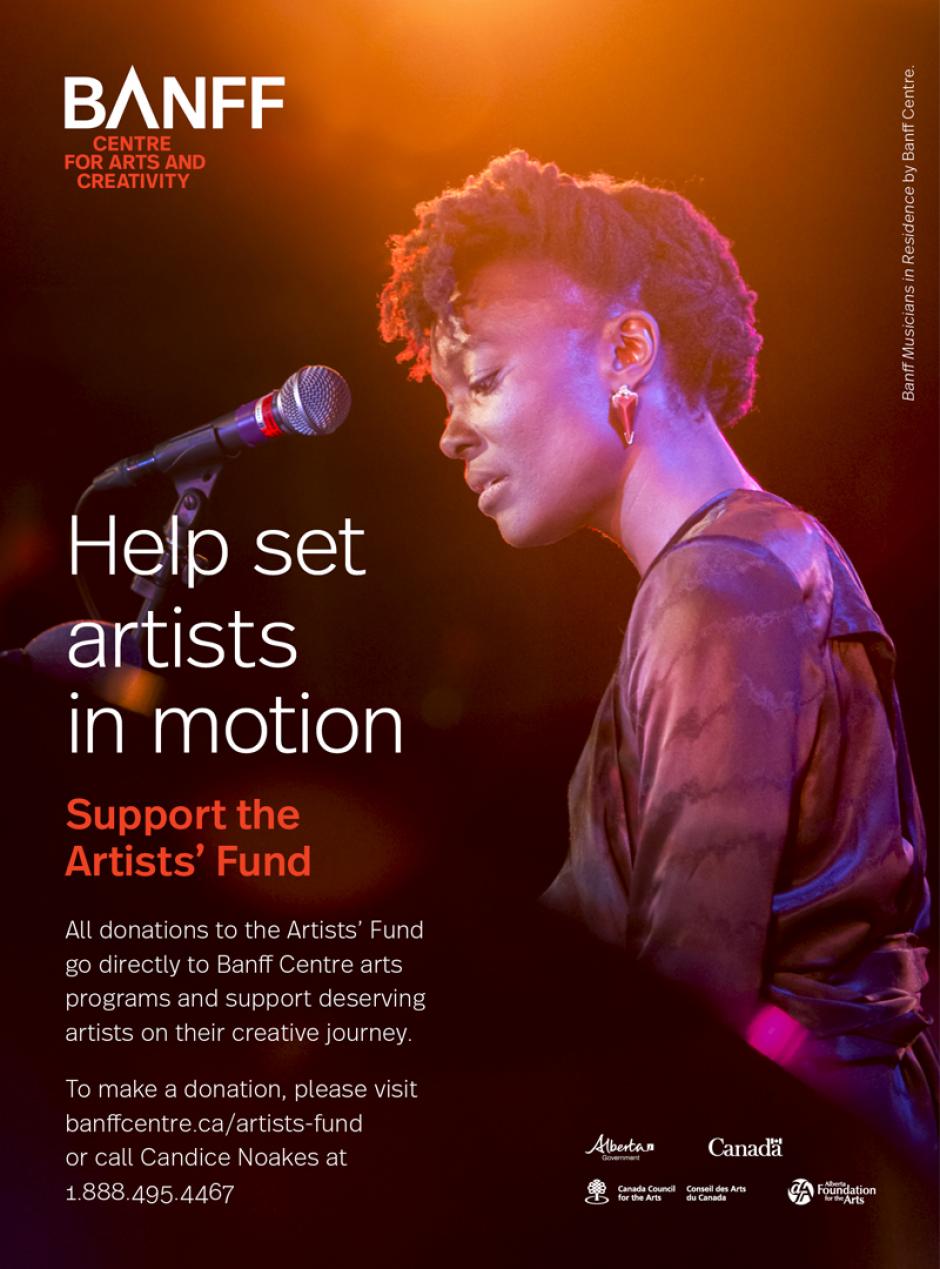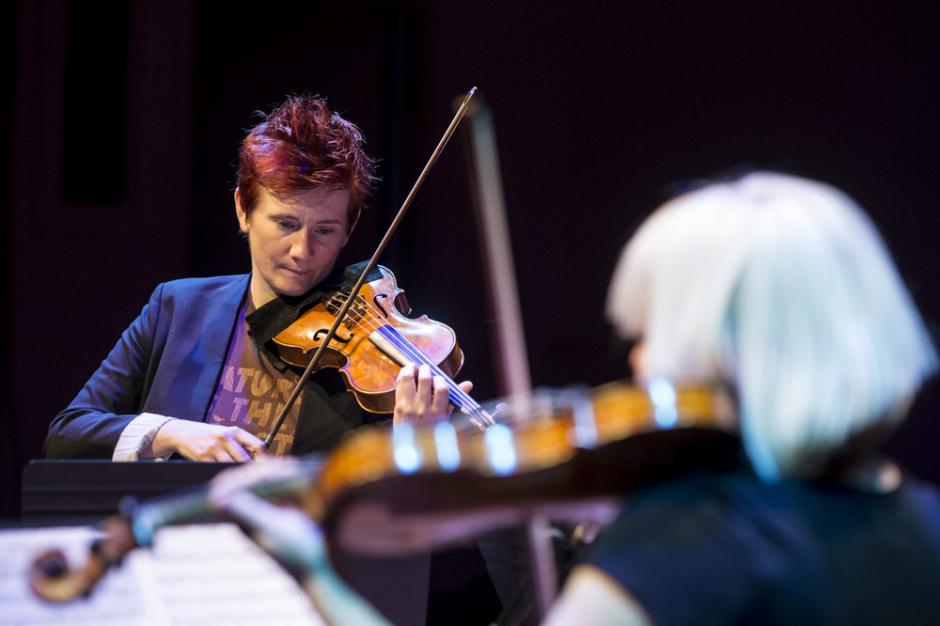
Image courtesy Banff Centre.
Artistic Credits
Banff Centre Staff
Message from Artistic Director
Welcome to Evolution of the String Quartet.
I am honoured to serve as Program Director for EQ’s second summer. It was as a participant in music programs at the Banff Centre that I first fell in love with string quartets, and playing quartets has remained at the core of my musical life ever since. My hope is that Evolution of the String Quartet will build on the long and storied tradition the string quartet genre already has at the Banff Centre.
Over the next three weeks our participants and faculty will dive deep into the study of historical performance practice, the refinement of standard repertory, and the creation and interpretation of new quartet music. Where did the string quartet start? Why did it become such a popular form of chamber music? What is the future of the string quartet? These are topics we will explore together through playing, performance and discussion.
Integral to EQ’s core philosophy is the presence of composers and the living tradition of the creative process. I am proud that this summer we have three world-renowned composition faculty members to mentor our participant composers. No less than nine world premieres will be performed at EQ over the course of the program.
Goethe once described the string quartet as “four rational people conversing with one another”. I trust we all agree that our troubled world stands to benefit greatly from more rational discourse. We invite you to join us in our discourse with music and through music to consider the larger issues of our time.
To me one of the most compelling things about string quartets is that, when a group truly connects, it becomes even more than the sum of its parts. Four individuals unite in artistic flight and become something new, something greater.
There’s magic in string quartets. There’s magic in Banff. Let’s listen.
- Aisslinn Nosky
About the Program
Led by violinist Aisslinn Nosky and featuring four of the most exciting string quartets to be found anywhere — JACK, Eybler, Parker, and Bozzini quartets — along with an extraordinary group of soloists, composers, and scholars, Evolution of the String Quartet (EQ) explores the string quartet lineage from Haydn to music made in Banff by and for the faculty and participants of EQ.
Biographies


Claire Chase, described by The New Yorker as "the young star of the modern flute," is a soloist, collaborative artist, curator, educator and advocate for the music of our time. Over the past decade she has given the world premieres of hundreds of new works for the flute in performances throughout the Americas, Europe, Australia and Asia, and she has championed new music by building organizations, forming alliances, pioneering commissioning initiatives and supporting educational programs that reach new audiences. She was named a MacArthur Fellow in 2012, and in 2017 was the first flutist to be awarded The Avery Fisher Prize.
In 2013 Chase launched Density 2036, a 23-year commissioning project to create an entirely new body of repertory for solo flute leading up to 2036, the centenary of Edgard Varèse’s groundbreaking 1936 flute solo, Density 21.5. She was the 2009 Grand Prize Winner of the Concert Artists Guild International Competition, and made her critically-acclaimed Carnegie Hall recital debut in 2010. In 2015, Chase was honored with the American Composers Forum Champion of New Music Award. She is the founder and flutist of the International Contemporary Ensemble (ICE), and Professor of Practice at Harvard University's Department of Music.
Co-Artistic Director
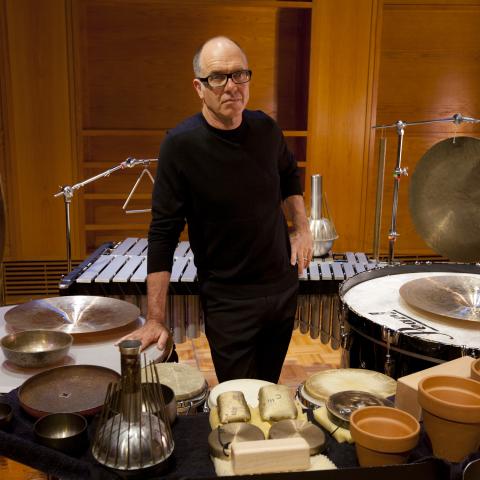

Steven Schick
Percussionist, conductor, and author Steven Schick was born in Iowa and raised in a farming family. For forty years he has championed contemporary music by commissioning or premiering more than one hundred-fifty new works. Schick is music director of the La Jolla Symphony and Chorus and artistic director of the San Francisco Contemporary Music Players. He was music director of the 2015 Ojai Festival. He maintains a lively schedule of guest conducting including recent appearances with the BBC Scottish Symphony Orchestra, the Saint Paul Chamber Orchestra, Ensemble Modern and the Asko/Schönberg Ensemble. Among his acclaimed publications include a book, “The Percussionist’s Art: Same Bed, Different Dreams,” and numerous recordings of contemporary percussion music including a 3 CD set of the complete percussion music of Iannis Xenakis (Mode) and a companion recording of the early percussion music of Karlheinz Stockhausen in 2014 (Mode). Steven Schick is Distinguished Professor of Music and holds the Reed Family Presidential Chair at the University of California, San Diego.
Co-Artistic Director
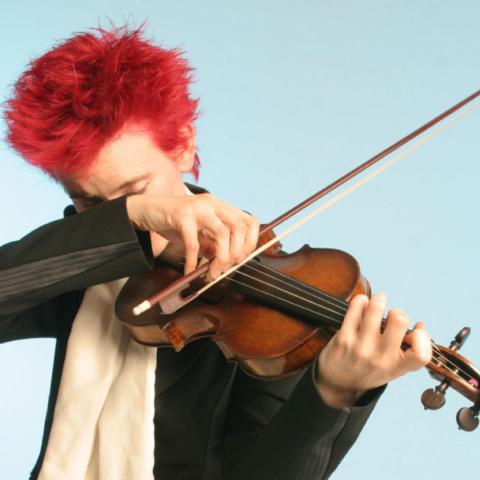

Aisslinn Nosky was appointed Concertmaster of the Handel and Haydn Society in 2011 and Principal Guest Conductor of the Niagara Symphony Orchestra in 2016. With a reputation for being one of the most dynamic and versatile violinists of her generation, Nosky is in great demand internationally as a soloist, director and concertmaster. Aisslinn is also a member of I FURIOSI Baroque Ensemble. For almost two decades, this innovative Canadian ensemble has presented its own edgy and inventive concert series in Toronto and toured Europe and North America turning new audiences on to Baroque music. With the Eybler Quartet, Nosky explores repertoire from the first century of the string quartet literature on period instruments. From 2005-16, Aisslinn was a highly active member of Tafelmusik Baroque Orchestra and toured and appeared as soloist with this renowned ensemble. Ms. Nosky’s latest recording of Haydn’s Violin Concerto in A Major with the Handel and Haydn Society will be released in 2017 on the CORO label.
Program Director
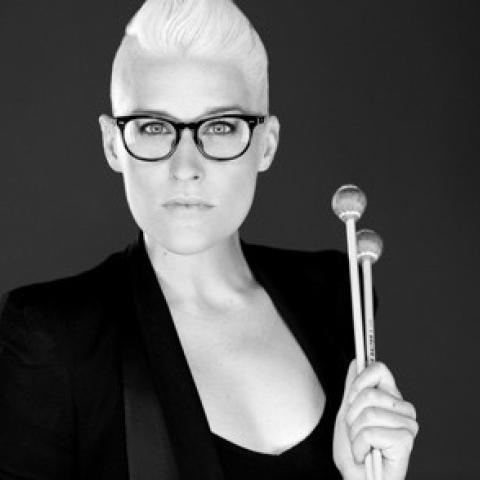

Fiona Digney
Fiona Digney is an Australian-born multi-faceted percussionist and producer who holds both education and performance degrees from Australia, The Netherlands, and USA, and is currently based in California while she completes doctoral studies under the guidance of Prof. Steven Schick. She has enjoyed a wide-ranging freelance career performing in solo, ensemble, and theatrical settings in Australia, China, Canada, The Netherlands, Sweden, England, Mexico, and the United States. As an avid proponent of new music, she has commissioned and premiered various percussion works from composers across the globe, and has been involved in many new and experimental music ensembles. Theatre credits include Caligula with Cripple Creek Theatre Company in New Orleans, The Cherry Orchard and Perestroika in San Diego, Caesar with Het Zuiderlijk Toneel in The Netherlands and Belgium, Becoming the System with Diamantfabriek in The Netherlands, and the European premiere of Anne Washburn’s highly acclaimed post-electric play, Mr. Burns at the Almeida theatre, London. Fiona has performed with West Australian Symphony Orchestra, San Diego Symphony, La Jolla Symphony, Tetrafide percussion quartet (AUS), Ensemble 64.8 and red fish blue fish (USA), as well as a soloist at Club Zho and the launch of the Totally Huge New Music Festival (AUS). Fiona has been involved in producing the Ojai Music Festival (2016-18), and the It’s About Time percussion festival in San Diego.
Artistic Producer
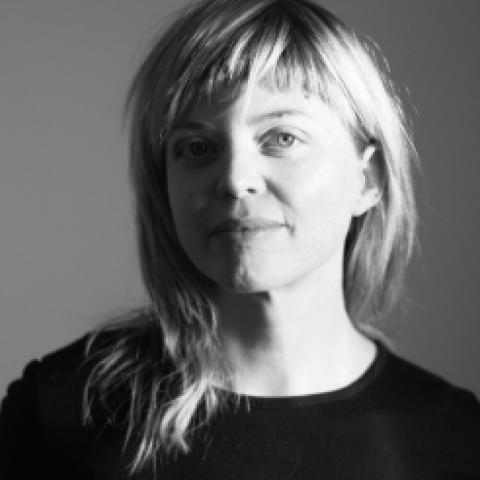

Composer-performer Sabrina Schroeder integrates tactile transducers, live processing, and self-built mechanics into performances that dig into heavy sound spaces that are as much about body-feel as they are about audible sound.
She’s been an active member of composer-performer collectives presenting scored and improvised music and a back-up-band coordinator for teens in mental health housing, and works collaboratively in a range of interdisciplinary settings.
Recent and active projects include commissions for ICE Ensemble (New York/Chicago), the Americas Society (New York), JACK Quartet (New York), No Hay Banda (Montreal), Architek Percussion (Toronto), and a collaborative project with theatre creator Jenna Harris and Thin Edge Collective (Toronto).
Schroeder spent the summer of 2018 as a resident fellow at Civitella Ranieri (Umbria, Italy) and the Experimentalstudio des SWR (Freiburg, Germany). Other awarded residencies have included the Banff Leighton Studios (Banff, Canada), Cité Internationale des Arts (Paris, France), and Villa Romana (Florence, Italy).
Schroeder has been on the faculty of iEAR (Integrated Electronic Arts) department at Rensselaer Polytechnic Institute (Troy, New York), the Royal Northern College of Music (Manchester, UK), and the Banff Summer Music Programs (Banff, Canada).
She is currently Assistant Professor of Composition at Simon Fraser University’s interdisciplinary School for the Contemporary Arts (Vancouver, Canada).
Faculty Composer
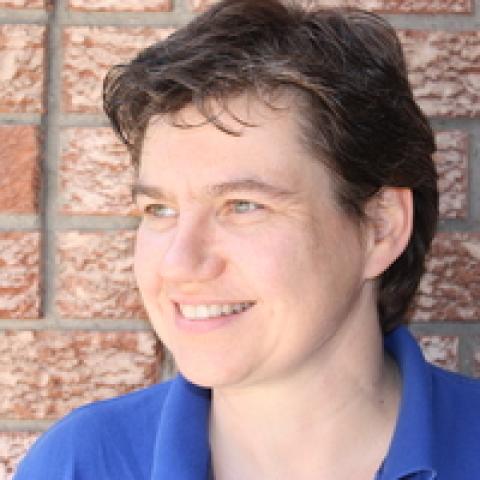

Suzannah Clark, AKC, BMus, MMus, MFA, MA, PhD, is Professor of Music at Harvard University. Before moving to Harvard in 2008, she taught at Oxford University for eight years. Clark specializes in the music of Franz Schubert, the history of music theory, and medieval music. Her book Analyzing Schubert was published by Cambridge University Press in 2011. Clark has given lectures in the UK, USA, Canada, France and Germany and has held fellowships from the Deutscher Akademischer Austausch Dienst (Germany), Social Sciences and Humanities Research Council (Canada), British Academy (UK), Arts and Humanities Research Council (UK). Most recently she was the William J. Bouwsma Fellow at the National Humanities Center in North Carolina. She currently serves on Council for the American Musicological Society and, starting in 2013, will be Reviews Editor for the Journal of the American Musicological Society. At Harvard, Clark teaches courses primarily in music theory, but also in historical musicology. Suzannah Clark grew up mainly in Newfoundland, Canada and also went to schools in England, France and Italy. She did her undergraduate and master’s degrees at King’s College London (UK) and graduated with an MFA (1993) and PhD (1997) from Princeton University.
Faculty Guest Speaker
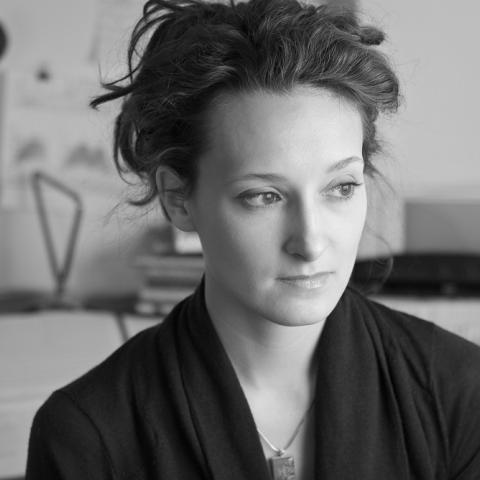

Zosha Di Castri is a Canadian composer/pianist living in New York. Her work (which has been performed in Canada, the US, South America, Asia, and Europe) extends beyond purely concert music including projects with electronics, sound arts, and collaborations with video and dance. She has worked with such ensembles as the San Francisco Symphony, Montreal Symphony Orchestra, the National Arts Centre Orchestra, the L.A. Philharmonic, the Chicago Symphony Orchestra, the New York Philharmonic, ICE, Wet Ink, Ekmeles, JACK Quartet, Yarn/Wire, the NEM, and Talea Ensemble among others. Zosha is currently the Francis Goelet Assistant Professor of Music at Columbia University.
Faculty Composer
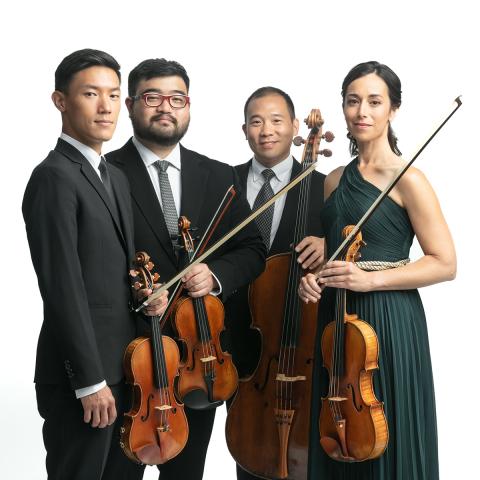

Daniel Chong, violin | Ken Hamao, violin | Jessica Bodner, viola | Kee-Hyun Kim, cello
Internationally recognized for their “fearless, yet probingly beautiful” (The Strad) performances, the Grammy Award-winning Parker Quartet has rapidly distinguished itself as one of the preeminent ensembles of its generation, dedicated purely to the sound and depth of their music. Inspired performances and exceptional musicianship are hallmarks of the Quartet, having appeared at the world’s most illustrious venues since its founding in 2002.
Recent seasons included performances around the United States and Europe, including Wigmore Hall, Konzerthaus Berlin, Music Toronto, Philadelphia Chamber Music Society, Strathmore, San Antonio Chamber Music Society, University of Chicago, the Schubert Club, and Kansas City’s Friends of Chamber Music.
This season the Quartet marks their 20th anniversary with The Beethoven Project, a multi-faceted initiative which includes performances of the complete cycle of Beethoven’s string quartets; the commissioning of six composers to write encores inspired by Beethoven’s quartets; the creation of a new video library spotlighting each Beethoven quartet; and bringing Beethoven’s music to non-traditional venues around the Quartet’s home base of Boston, including homeless shelters and youth programs.
The Quartet is committed to working with composers of today — recent commissions include works by Augusta Read Thomas, Felipe Lara, Jaehyuck Choi, and Zosha di Castri. Celebrating the process of creation, the Quartet recorded three new commissions by Kate Soper, Oscar Bettison, and Vijay Iyer as part of Miller Theatre’s Mission: Commission podcast.
Additionally, the Quartet regularly collaborates with a diverse range of artists, including pianists Menahem Pressler, Orion Weiss, Shai Wosner, Billy Childs, and Vijay Iyer; members of the Silk Road Ensemble; clarinetist and composer Jörg Widmann; clarinetists Anthony McGill and Charles Neidich; flutist Claire Chase; and violist Kim Kashkashian, featured on their recent Dvořák recording. The Quartet also continues to be a strong supporter of Kashkashian’s project Music for Food, participating in concerts throughout the United States for the benefit of various food banks and shelters.
Recording projects continue to be an important facet of the Quartet’s artistic output. Described by Gramophone Magazine as a ”string quartet defined by virtuosity so agile that it’s indistinguishable from the process of emotional expression,” their newest release for ECM Records features Dvořák's Viola Quintet as well as György Kurtág's Six Moments Musicaux and Officium breve in memoriam. The Strad also declared the album as “nothing short of astonishing.” Under the auspices of the Monte Carlo Festival Printemps des Arts, they recorded a disc of three Beethoven quartets, of which Diapason “admired the group’s fearlessness, exceptional control, and attention to detail.” The Quartet can also be heard playing Mendelssohn on Nimbus Records, Bartók on Zig-Zag Territoires, and the complete Ligeti Quartets on Naxos, for which they won a Grammy Award for Best Chamber Music Performance.
The members of the Parker Quartet serve as Professors of the Practice and Blodgett Artists-in-Residence at Harvard University’s Department of Music. The Quartet also holds a visiting residency at the University of South Carolina and spends its summers on faculty at the Banff Centre’s Evolution: Quartet program.
Founded and currently based in Boston, the Parker Quartet’s numerous honors include winning the Concert Artists Guild Competition, the Grand Prix and Mozart Prize at France’s Bordeaux International String Quartet Competition, and Chamber Music America’s prestigious Cleveland Quartet Award.
Photo by Beowulf Sheehan
Faculty Quartet
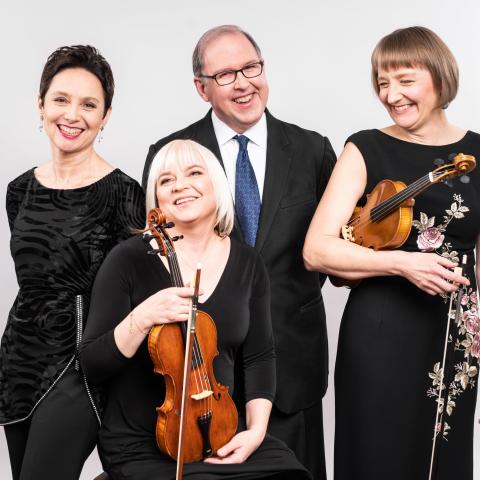

The Eybler Quartet came together in late 2004 to explore the works of the first century and a half of the string quartet, with a healthy attention to lesser known composers such as their namesake, Joseph Leopold Edler von Eybler. The group brings a unique combination of talents and skills: razor-sharp ensemble skills, technical prowess, expertise in period instrument performance and an unquenchable passion for the repertoire. The Toronto- based ensemble’s live performances have consistently garnered praise as “glowing and committed”, “spirited” and “lively and energizing”. Their recording of Joseph Haydn’s Op. 33 String Quartets for the Analekta label was called “simply a treasure” by Early Music America, “the tempos are beautifully chosen, the ensemble perfect, and the intonation absolutely pure. This is music-making that reflects the deeply human and attractive qualities found in Haydn the composer—good humor, wit, and invention.” Their recording with clarinetist Jane Booth won praise from Gramophone for being “totally engaging performances that breathe life into Backofen’s music”. Their Beethoven Quartets, Opus 18 nos. 1-3 garnered this praise from Gramophone: “…the revelations flood in: the swiftness with which the Eyblers take the great Adagio of Op 18 No 1 allows violinist Aisslinn Nosky’s almost vibrato-free period-instrument tone to sound breathtakingly fragile.” Violinists Julia Wedman and Patricia Ahern, and violist Patrick G. Jordan are members of Tafelmusik Baroque Orchestra. Cellist Margaret Gay is much in demand as both a modern and period instrument player. This summer the group will again be on the faculty at the Banff Centre as part of the EQ: Evolution of the String Quartet program.
In September 2022 Patricia Ahern joined the group, replacing founding member Aisslinn Nosky.
Faculty Quartet
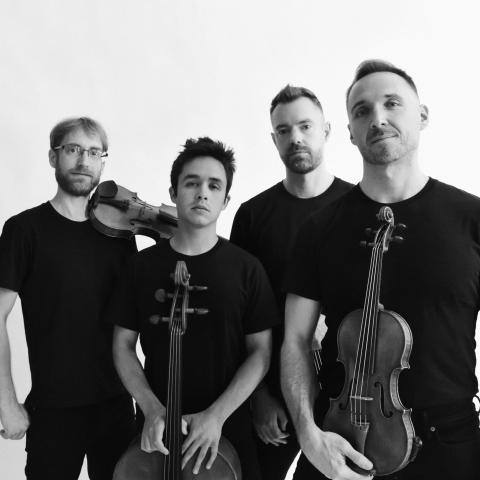

Hailed by The New York Times as “our leading new-music foursome”, the JACK Quartet is one of the most acclaimed, renowned, and respected experimental string quartets performing today. Comprising violinists Christopher Otto and Austin Wulliman, violist John Pickford Richards, and cellist Jay Campbell, JACK operates as a nonprofit organization dedicated to the performance, commissioning, and appreciation of new string quartet music. The quartet was selected as Musical America’s 2018 “Ensemble of the Year”, nominated for GRAMMY Awards for recordings in 2018 & 2022, named to WQXR’s “19 for 19 Artists to Watch”, and awarded an Avery Fisher Career Grant, as well as the Fromm Music Foundation Prize.
Through intimate relationships with today’s most creative voices, JACK embraces close collaboration with the composers they perform, leading to a radical embodiment of the technical, musical, and emotional aspects of their work. The quartet has worked with artists such as Julia Wolfe, George Lewis, Helmut Lachenmann, and Caroline Shaw, with upcoming and recent premieres including works by John Luther Adams, Catherine Lamb, Liza Lim, Tyshawn Sorey, Wadada Leo Smith, Amy Williams, and John Zorn. JACK’s all-access initiative, JACK Studio, funds collaborations with a selection of artists each year, who receive money, workshop time, mentorship, and resources to develop new works for string quartet.
Committed to education, JACK is the Quartet in Residence at the Mannes School of Music, where they provide mentorship to Mannes’s Cuker and Stern Graduate String Quartet. They also teach each summer at New Music on the Point, a contemporary chamber music festival in Vermont for young performers and composers, and at the Banff Centre for Arts and Creativity. JACK has long-standing relationships with the University of Iowa String Quartet Residency Program, where they teach and collaborate with students each fall and spring, as well as with the Lucerne Festival Academy, of which the four members are all alumni.
Photo by Shervin Lainez
Faculty Quartet
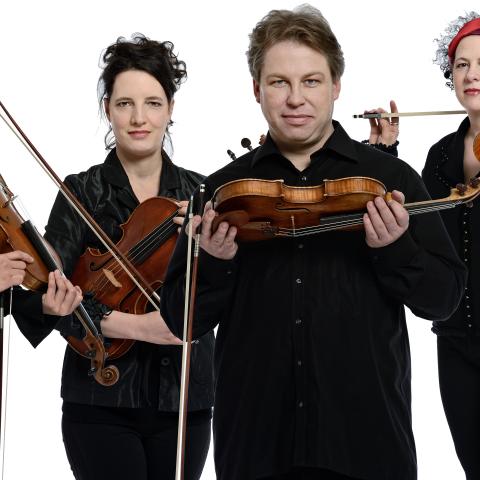

Quatuor Bozzini
Since 1999, Quatuor Bozzini has been an original voice in new, experimental and classical music. Their skew is radically contemporary, propelling the hyper-creative Montréal scene, and beyond. Not content to parlay received wisdom, the quartet cultivates an ethos of risk-taking, and boldly venture off the beaten track. Quatuor Bozzini stands out with their “extraordinary playing.” (Alex Ross, The New Yorker). With rigorous qualitative criteria, they have nurtured a vastly diverse repertoire, unbiased by the currents of fashion. This has led to close to two hundred commissioned pieces, as well as over three hundred premiered works. A Quatuor Bozzini concert is an intensely shared experience, with meticulous and sensuous attention to detail.
Praised by its “intense musicality and immense sensitivity” (Musicworks, Canada), Quatuor Bozzini was qualified in the Bandcamp Daily as “one of the most daring string quartets of the entire world.” The group presents an annual concert series in Montréal and also tours extensively in Canada, the US, South America and Europe. Notable festivals and venues include MärzMusik (Berlin), Ultima (Oslo), Huddersfield (UK), Klangspuren (Austria), Tsuda Hall (Tokyo), Musiekgebouw (Amsterdam), November Music (Netherlands), Présences (France), Kortrijk (Belgium), TimeSpans (NYC), Porgy&Bess (Vienna) and Other Minds (San Francisco). To ensure continual development in their art, the quartet’s musical laboratories, the Composer’s Kitchen, Performer’s Kitchen and Bozzini Lab, work to mentor and support new generations of composers and performers. The quartet runs its own recording label, Collection QB, and has issued critically acclaimed albums, many of which have become reference recordings in the discipline. They also have issued albums with Edition Wandelweiser, Another Timbre, Wergo-Deutscher Musikrat, Centrediscs and ATMA Classique.
In 2018, Quatuor Bozzini was awarded the “Performer of the Year” Opus Prize by the Conseil québécois de la musique. Finalist to the 28th Grand Prix (Conseil des arts de Montréal, 2012), Quatuor Bozzini is also the recipient of three Opus Prizes “International Outreach” (2007), “Contemporary Disc of the Year” (2004), and “Discovery of the Year” (2001) as well as the Étoile-Galaxie Prize from Radio-Canada (2001), the Förderpreis Ernst von Siemens Musikstiftung (2007), the German Record Critics Prize for Arbor Vitae (2009) and the 2014 Friends of Canadian Music Award.
Faculty Quartet
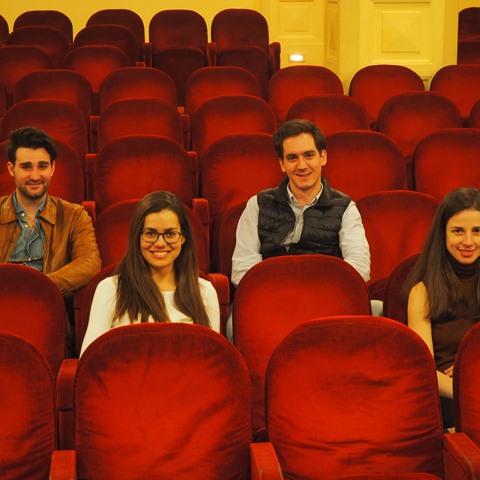

Alauda Quartet
First and Public Prize winners of the International Chamber Music Competition (Massimiliano Antonelli) in Italy 2018, artist in residence at Snape Malting in Aldeburgh 2018, finalist and fourth prize at the 2017 Orlando International Chamber Music Competition, Making Music Concert Artist 2016-17 and Park Lane Group Artist 2015, the Alauda Quartet was formed at the Royal Academy of Music in London in 2011 and held a Leverhulme Chamber Music Fellowship during 2013-14. In 2019, Alauda Quartet was awarded the Associate of the Royal Academy of Music, for their significant contribution to the music profession. The quartet has performed throughout the UK, Europe and Asia in venues including Barbican Hall, Wigmore Hall, Purcell Room, Queen Elizabeth Hall, St Martin-in-the-fields, Conway Hall, St Margarets Westminster, Kings Place, Auditorio Nacional de Alicante, Auditorio Nacional de Leon, Sala Umberto di Roma, Radio Vaticana, among others. They gave their debut recital at the National Centre for the Performing Arts in Beijing in 2014. The Alauda Quartet has broadcasted for Radio Nacional de España, Radio Vaticana in Rome, and Kultur Radio in Deutschland. They released their first album in 2016 with the Brilliant Classics label, featuring the 2 string quartets of Italian composer, Roffedo Caetani. The world premiere recording was supported by the Caetani foundation and received very good critics from Strad and Gramophone magazine. Cristina plays a Jean Baptiste Vuillaume, kindly on loan from Merito String Instruments Trust Vienna.
Participant Quartet
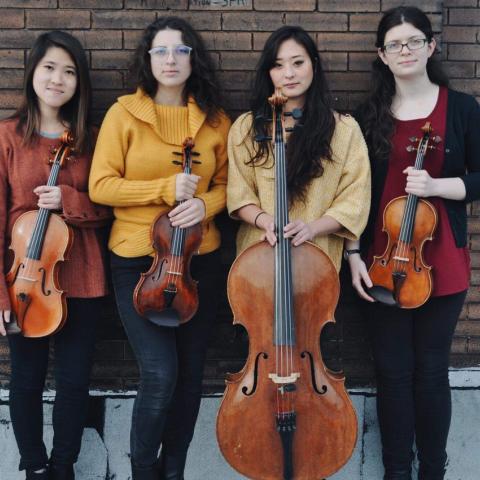

Bergamot Quartet
Founded in Baltimore, Maryland in 2016, the Bergamot Quartet is dedicated to interpreting the music of living composers. They were recently featured at the Kennedy Center's Millennium Stage performing George Crumb's Black Angels, which formed the centerpiece of their Spring 2018 season. They have also made appearances with Claire Chase in Anthony Cheung’s Real Book of Fake Tunes, and on The Evolution Contemporary Music Series, performing works by Julia Wolfe, Bryce Dessner, Jason Treuting, Gemma Peacocke, and Jessie Montgomery. In 2017, the Bergamot Quartet premiered the revised version of Oscar Bettison's Presence of Absence alongside Ensemble Klang, and also participated in a performance of Georg Freidrich Haas's in vain. In the summer of 2018, they attended the Banff Centre’s Evolution of the String Quartet program, as well as the Diotima Academie in France with the Diotima Quartet, and the Next Festival of Emerging Artists. Their 2019-20 season will include academic residencies at Towson University, University of Maryland Baltimore Country, and the University of Baltimore. The Bergamot Quartet is Ledah Finck and Sarah Thomas (violins), Amy Tan (viola), and Irene Han (cello).
Participant Quartet
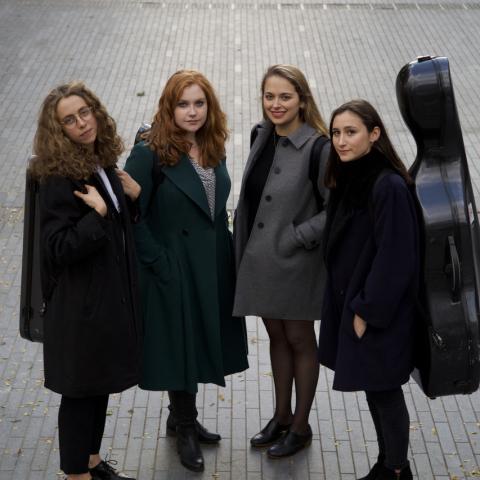

Echea Quartet
Finalists and prizewinners of the International Anton Rubinstein Chamber Music Competition and the Royal Overseas-League Music Competition, the Echéa Quartet is a London-based string quartet formed in 2017 at the Royal Academy of Music. They were awarded Fellowship String Quartet for 2019/20 at the Royal Academy, mentored by John Myerscough, Christoph Richter, and Levon Chilingirian. In 2017, the quartet was awarded the St Peter’s Chamber Music Prize, which they performed as part of the Eaton Square Concert Series. They performed in masterclasses for Adrian Brendel, Miguel da Silva, Hartmut Rohde, and members of the London Haydn and Belcea quartets. Echéa Quartet was the quartet-in-residence at Ferrandou Musique, Dordogne in summer 2018, where there gave recitals and collaborated with the British baritone, David Wilson-Johnson. They were awarded Fellowship Quartet at Wintergreen Performing Arts, touring across Virginia, and worked and performed with violinist Rachel Barton Pine. Highlights of 2019 included a performance at Musikverein in Vienna and collaboration with Marin Alsop at the World Economic Forum in Davos, Switzerland. Dedicated to the performance of new music, the Echéa Quartet performed at the Krama Contemporary Music Festival in Athens, Greece. They will be working closely with Harrison Birtwistle at the Royal Academy and Henning Kraggerud at the West Cork Chamber Music Festival. The Echéa Quartet will be attending the Banff Centre’s Evolution of the String Quartet program, before touring the west-coast of North America this August and September.
Participant Quartet
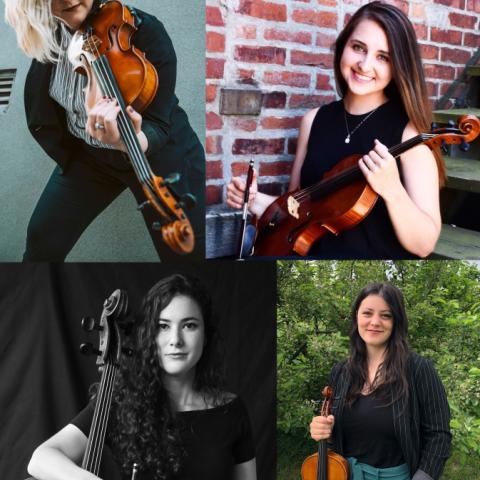

Hexum Quartet
The Hexum Quartet was formed in January 2019 in Boulder, Colorado. Hexum is an avid musical presence in the Boulder and Denver communities, performing at schools and community centers. Prior to forming Hexum, members of the quartet have attended summer music festivals such as Bowdoin, Meadowmount, Aspen, Kent Blossom, and Tafelmusik Baroque Summer Institute as scholarship recipients. They have also studied with members of the Takács Quartet, Jasper Quartet, Time For Three, Eybler Quartet, and Pacifica Quartet. Their current coach is Karóly Schranz of the Takács Quartet.
Participant Quartet
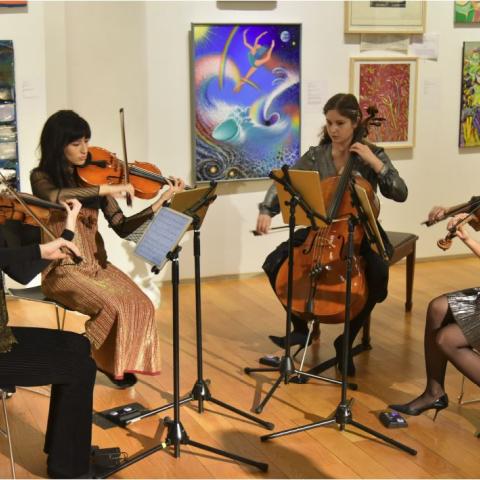

Quartet121
Quartet121 is a New York City-based string quartet dedicated to the performance of new works. Molly Germer (violin), Julia Jung Un Suh (violin), Lena Vidulich (viola), and Thea Mesirow (cello) met while pursuing their Master’s degrees in the Contemporary Performance Program at Manhattan School of Music. The members of Quartet121 have varied backgrounds performing with symphony orchestras at venues throughout the US and Europe, recording for film and television, working with established new music ensembles, and collaborating with composers. In the quartet’s official first season they performed alongside critically acclaimed ensembles such as MIVOS Quartet and TAK, joined Japanese Breakfast for two sold-out shows at Brooklyn Steel, and visited the Columbia University Music Department as guest performers. Their next season includes performances and residencies at Manhattan School of Music and University of Pennsylvania, among other projects throughout U.S. Quartet121 is fiercely committed to innovative works and is excited to be a part of the growing world of contemporary chamber music.
Participant Quartet
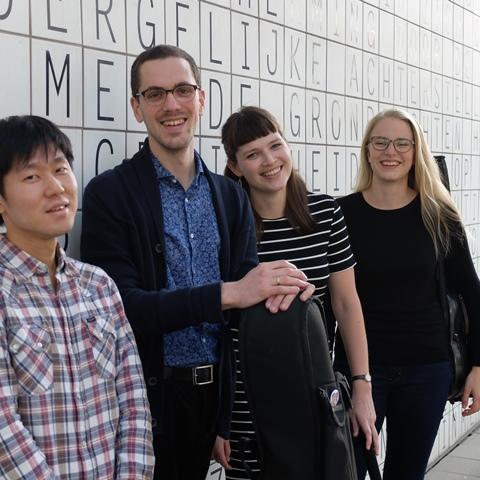

ZeeheldenQuartet
Founded in September 2017, ZeeheldenQuartet is a string quartet passionate about the exploration of 18th- and 19th-century chamber music on period instruments. Each member of the quartet comes from a different part of the globe: Australia (Emma Williams, violin), Japan (Takuto Takagishi, violin), Ecuador (Simon Gangotena, viola), and Israel (Yotam Haran, cello). Their diverse educational, professional, and cultural backgrounds often lead to an eclectic mix of musical ideas. As both current and recent graduates of Royal Conservatory of The Hague, the Conservatorium van Amsterdam, and Melbourne Conservatorium of Music, each member of the quartet is developing specialised research in Classical and Romantic performance practices. They perform regularly in The Netherlands, including a chamber music concert for the Beethoven Festival of The Hague in October 2018.
Participant Quartet
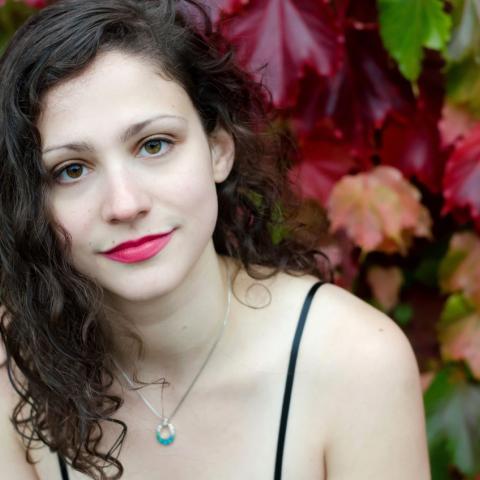

Alexa Ciciretti
American cellist Alexa Ciciretti has established herself as a performer who is equally at home playing Baroque viola da gamba music, Romantic symphonies, cutting-edge contemporary music and everything in between. She has performed as a member of the New World Symphony, Rochester Philharmonic, Lucerne Festival Academy Orchestra, and Aspen Chamber Symphony. She served as continuo cellist for the United States premiere of Vivaldi’s Farnace at Spoleto Festival U.S.A. and will perform at the Ojai Festival in June 2019. She has also performed with the Miami-based group Flamenco Sephardit and recently starred in the short film A Waning Heart, which was screened at the 2018 Cannes Film Festival. Ms. Ciciretti studied at Eastman School of Music and Oberlin Conservatory. When not playing cello, she enjoys to cook, to eat chocolate and the weather in her native New England.
Participant
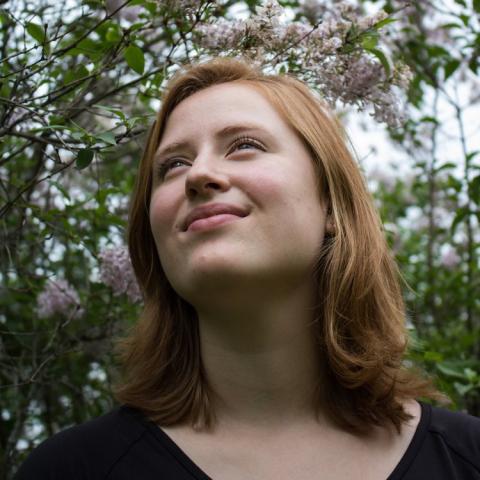

Martine Thomas
Martine Thomas (violist), is completing a Master's in Viola Performance at New England Conservatory as the final year of the Harvard-NEC Dual Degree program. She is an artist with the Silk Road Ensemble, and close collaborator with several composers, including Camila Agosto and Brandon Snyder. Martine received her Bachelor of Arts in English from Harvard, where she studied poetry with Jorie Graham.
Participant
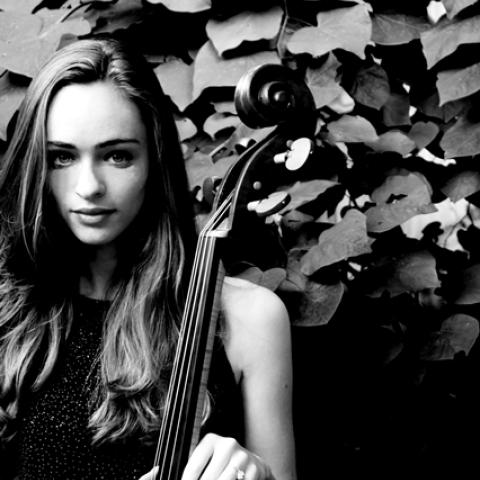

Leah Plave
American cellist Leah Plave is dedicated to performing fresh interpretations of the classics, to discovering hidden gems, and to being a voice for modern composers. She is a Lincoln Center Stage artist and founding member of award-winning Z4 Piano Quartet, with whom she has performed everything from classical to jazz in halls all Canada, United States, Mexico, and Asia. In 2019, she performed the North American premiere of Works for cello and piano by Henriette Bosmans, and released her debut album, The Rediscovery of Henriette Bosmans with her duo partner and pianist, Dr. Dan Sato.
Leah received her Bachelor's degree in Music from University of Cincinnati College-Conservatory of Music and Franz Liszt Academy of Music, and her Master's degree in Music at McGill's Schulich School of Music. Her significant mentors have included Yehuda Hanani, Csaba Onczay, Jean Marchand, Mark Fewer, and Matt Haimovitz.
Participant
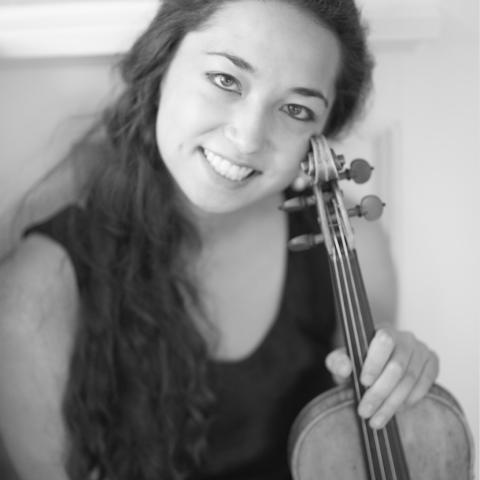

Eloise Hodges
Eloise Hodges, a Denver native, is a sophomore at Harvard University where she studies with Kristopher Tong of the Borromeo Quartet and the New England Conservatory faculty. She has also studied with Bing Wang, associate concertmaster of the LA Philharmonic, and David Halen, concertmaster of St. Louis Symphony at the Aspen Music Festival (summers 2016-18). She has played in master classes for Stefan Jackiw and Nicola Benedetti as well as members of the Cleveland, Emerson, and Juilliard string quartets. She also studied with Hagai Shaham, Joan Kwuon, and Grigory Kalinovsky at the Heifetz International Music Institute and Jan Sloman at the Meadowmount School of Music. She currently studies chamber music with the Parker Quartet and Katherine Chi and has performed as a soloist with regional orchestras throughout Colorado.
Participant
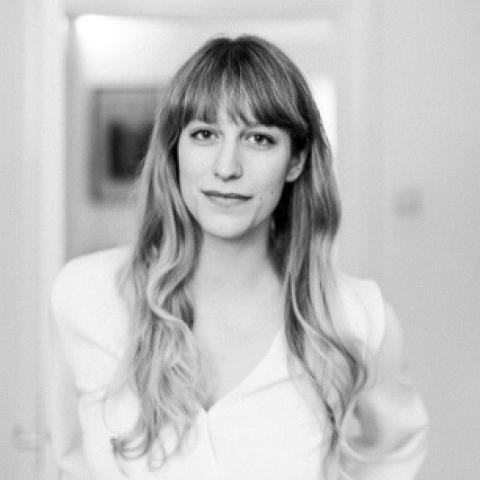

Anna Jane Lester
Anna Jane Lester began her violin studies at age four in Jacksonville, Florida. After earning her Bachelor’s degree in Violin Performance at Vanderbilt University studying with Cornelia Heard, she attended The Juilliard School for a Master of Music in Historical Performance, studying with Monica Huggett and Cynthia Roberts. She has since moved to the Netherlands, completing her studies with Walter Reiter and Kati Debretzeni. Anna Jane performs as a baroque violinist and violist with Holland Baroque, the Internationale Händel Festspiele Göttingen Orchestra, and PRJCT Amsterdam. Her chamber performances have brought her to stages from the Concertgebouw Amsterdam to the Smithsonian Institute to the Festival Oude Muziek Utrecht. This summer, Anna Jane looks forward to joining the Orchestra of the Age of Enlightenment on trial, performing with the Butter Quartet as finalists in the York Early Music Competition, and to appearing in the Rotterdam Bluegrass Festival with her trio Sweet Joe Pye.
Participant
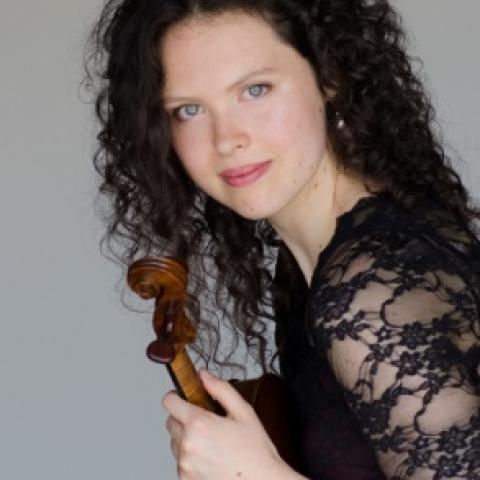

Chloe Prendergast
Chloe Prendergast is a violinist from Denver, Colorado. As a historical performance specialist and chamber musician, she is co-artistic director of the Beethoven Festival of the Hague and MusicBox, a member of Holland Baroque, founding member of the Butter Quartet and Duo ’t Viooltje, and performed both in the Netherlands and the United States with the Handel and Haydn Society, Seattle’s Pacific Musicworks, the Henry Purcell Society of Boston, the Baroque Chamber Orchestra of Colorado, the Luthers Bach Ensemble, Collegium Ad Mosam, Le Concert d'Apollon, the Arcadia Players, and Dutch Baroque. She has also appeared at music festivals internationally, including the Connecticut Early Music Festival, the Utrecht Early Music Fringe Festival, and Aigues-Vives en Musique. Chloe completed her Master’s degree at the Royal Conservatory of the Hague with Kati Debretzeni and Walter Reiter and her bachelor’s at Willamette University, where she was a Phil Hanni scholar and studied with Anthea Kreston and Daniel Rouslin.
Participant
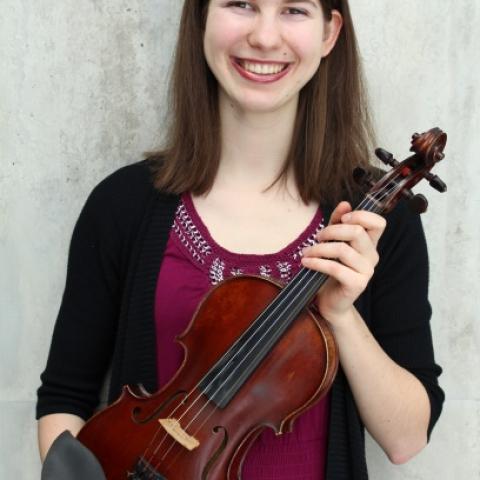

Rebecca Ruthven
Rebecca Ruthven is a Vancouver-based violinist and violist. She recently completed Bachelor degrees in Violin Performance and Biochemistry at McGill University, where she studied with Mark Fewer and Felicia Moye. While in Montréal, she was a member of the Mason String Quartet, Les Licornes Baroques chamber ensemble, and the McGill Baroque Orchestra. She took part in the Tafelmusik Baroque Summer and Winter Institutes, the Tuckamore Chamber Music Festival, and the Madeline Island Chamber Music program. A three-time alumnus of the National Youth Orchestra of Canada, she was the youngest Canadian musician in the Canada India Youth Orchestra project in Bangalore, and recipient of the Stephen Sitarski Leadership Award. She is originally from Kelowna, BC, where she performed with the Okanagan Symphony Orchestra while studying with Ken Stromberg, Heilwig von Konigslow, and Nancy DiNovo.
Participant
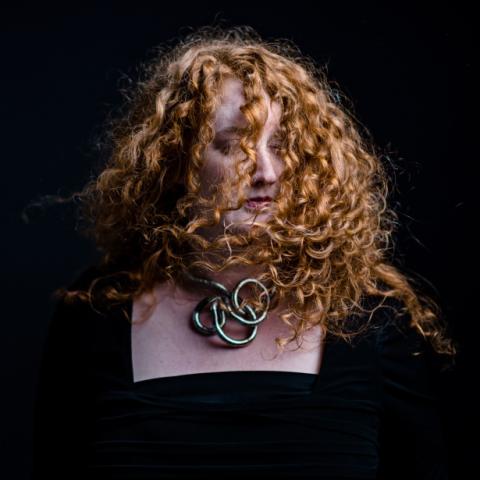

Amy Brandon
Canadian composer Amy Brandon's pieces have been described as '[...] mesmerizing' (Musicworks Magazine) and ‘Otherworldly and meditative ... [a] clashing of bleakness with beauty …’ (Minor Seventh). Recent and upcoming 2018-19 events include premieres by Ekmeles (NYC - ICEBERG New Music), Chartreuse Trio (Music in Bloom, Indiana), Winnipeg Symphony Orchestra, Pro Coro (Banff Centre), trombonist Dale Sorensen, pianist Yumi Suehiro (Tesselat), Continuum Contemporary Music Ensemble (PIVOT) as well as performances at Music in New Technologies (CAN), New Music Edmonton, and the Centre d’experimentation musicale in Quebec. She has received Canadian and international composition awards from the Leo Brouwer Guitar Composition Competition (Grand Prize), Central European String Quartet ('Most Innovative'), Groundswell and RMN Classical (Europe). She has performed as a guitarist in Canada, the United States, Australia, Brazil, New Zealand, the United Kingdom and is currently completing an interdisciplinary PhD in Music Cognition at Dalhousie University in Halifax, Nova Scotia.
Participant Composer
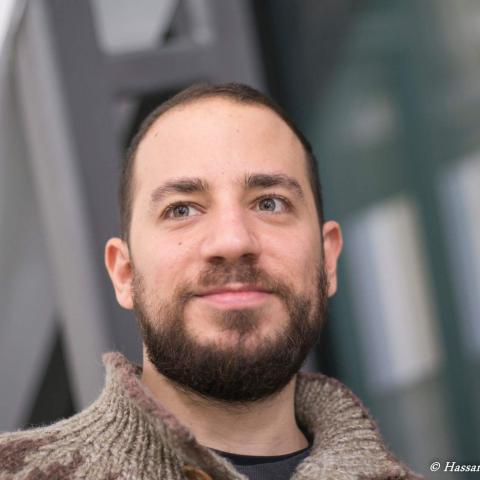

Yoav Chorev
Yoav Chorev studied composition at the Buchmann-Mehta Music School in Tel-Aviv University with Ruben Seroussi and Amnon Wolman. At 2016 he left for Linz, Upper Austria, to study at the Anton Bruckner Privatuniversität under the tutelage of Carola Bauckholt. He has been awarded scholarships through Holon’s municipality, Mifal Hapais and Experimentalstudio des SWR. Chorev participated in festivals and workshops at the SWR Matrix in Warsaw, Freiburg und Ljubliana, at the Larch Road Seminars in Harvard University and played by numerous groups, including Zone Experimèntale, Ensemble ET/ET, Ensemble Ascolta, Ensemble Reconsil, Ensemble formanti, and Moscow Contemporary Music Ensemble.
Participant Composer
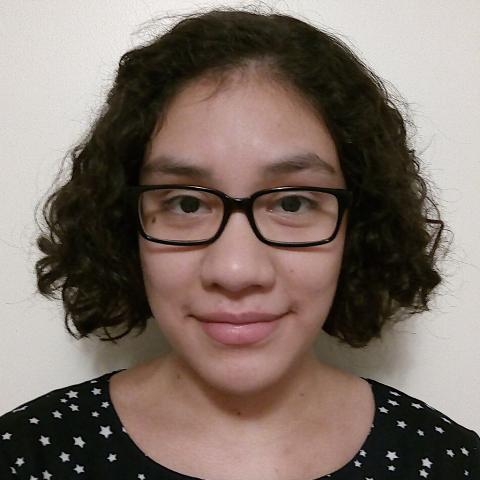

Pallas Loredo
Pallas Loredo is a composer based in St. John’s, Newfoundland. Much of her music is influenced by nature, from the sound of cicadas to the season of autumn, but she also takes inspiration from the musical world around her. From remixing a Chopin Prelude using midi synthesizers to writing post-modern variations on the Baroque Folia, Pallas enjoys reworking classical music to create something new. Although she is a classically-bred composer, Pallas grew up listening to Mexican folk music as well. She blended both genres in her piece for wind band, Variaciones sobre la Llorona, which was the first-place winner of the 2018 GCB Terra Nova Competition in the Arrangements Category. Pallas completed her B.Mus in composition at Memorial University of Newfoundland under the tutelage of Dr. Andrew Staniland and Dr. Clark Ross. She will be continuing her studies at UBC this fall pursuing a Master's degree in Composition.
Participant Composer
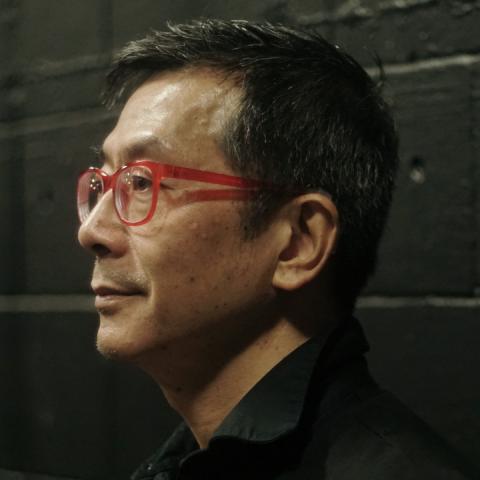

Kong Kie Njo
A picnic and ping pong enthusiast, Kong Kie also enjoys composing. His works include the same-sex rom-com opera knotty together and the music theatre work Mr. Shi and His Lover, the first-ever Chinese language production at the National Arts Centre in Ottawa. Long-serving music director of La La La Human Steps, Kong Kie has provided music for Nederlands Dans Theater, Ballet National de L’Opera du Rhin, Hubbard Street Dance Chicago, and Singapore Dance Theatre. Upcoming: I swallowed a moon made of iron, a Mandarin song cycle set to the poems of Xu Lizhi (Canadian Stage, 2019).
Participant Composer
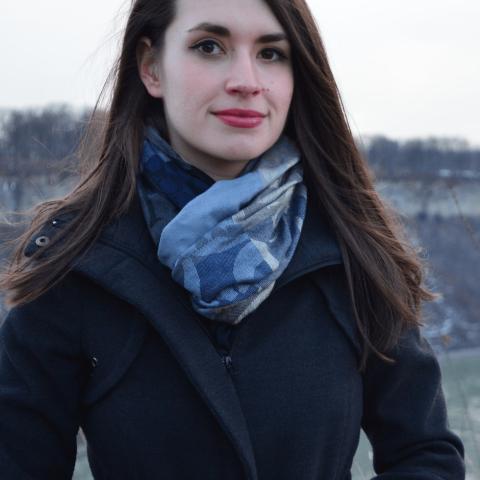

Christina Volpini
Described as richly textural, physical and affecting, composer Christina Volpini’s music acts as a generous, disorienting sound world open for exploration. Inspired by the patterning of natural and mechanical sonic environments, her music explores found objects, sonic spatialization, and the unfolding of small changes over time. Her work has gained recognition through performances and commissions by Esprit Orchestra, Array Ensemble, and Unheard Of Ensemble with performances in Toronto, Montréal, Vancouver, Edmonton, and New York. Christina is a core organizer of the Toronto Creative Music Lab, a grassroots professional development workshop for early-career artists promoting
peer mentorship, collaboration, and social responsibility.
Participant Composer
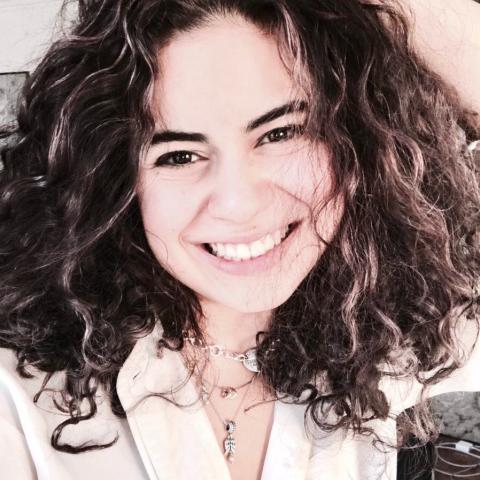

Kimia Koochakzadeh Yazdi
Kimia Koochakzadeh Yazdi (b. 1997 Tehran, Iran) is an Iranian composer based in Vancouver, Canada. Working with instrumental and electroacoustic media, she has actively collaborated on projects written for dance performance and film in addition to concert pieces. She seeks to incorporate into her music her experiences of the cultural contexts she has been living in so far. She was recently commissioned by Western From to write for their 8.2 octophonic sound system and her piece Displacement II for bass flute, bass clarinet, and live electronics was premiered by Vancouver New Music in February 2019. Koochakzadeh Yazdi is currently the artist in residence at Media Arts Committee while studying composition at Simon Fraser University with Sabrina Schroeder, Owen Underhill and Mauricio Pauly.
Participant Composer
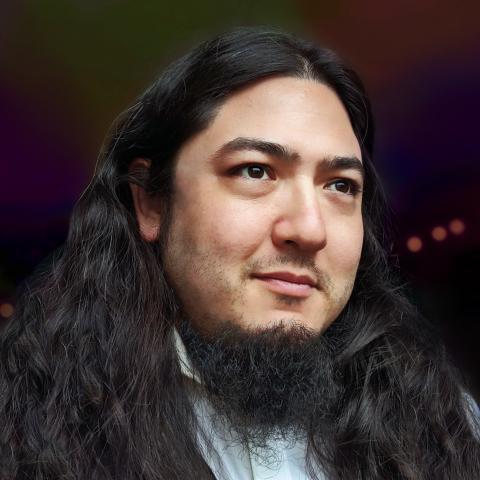

Paul Wiancko is an acclaimed composer, Director of Chamber Music at Spoleto Festival USA, cellist of the internationally celebrated Kronos Quartet, and founding member of the viola-cello duo Ayane & Paul and quartet-collective “dream group” (NY Times) Owls. The Washington Post calls Wiancko “a restless and multifaceted talent who plays well with others,” a reference to his collaborations with artists ranging from Max Richter, Chick Corea, and Norah Jones—to members of the Guarneri and JACK quartets—to bands like Arcade Fire, Dirty Projectors, and Wye Oak. “Even with this chronically collaborative spirit,” the Post continues, “Wiancko maintains a singular voice as a composer.”
Paul has been composer-in-residence at Spoleto Festival USA, Caramoor, Music from Angel Fire, Portland Chamber Music Festival, and numerous others, and has been commissioned by Alisa Weilerstein, Alexi Kenney, Brooklyn Chamber Music Society, and the St. Lawrence, Kronos, Aizuri, Calder, and Attacca Quartets. His music has been described as “delicate, harmonically rich,” “joyous, hard-driven” (NY Times), “dazzling, compelling” (Star Tribune), and “vital pieces that avoid the predictable” (Allan Kozinn). “If Haydn were alive to write a string quartet today,” NPR writes, “ it may sound something like Paul Wiancko's LIFT”—a piece that the NY Times says “teems with understanding of and affection for the string-quartet tradition.”
Faculty Composer/Cellist
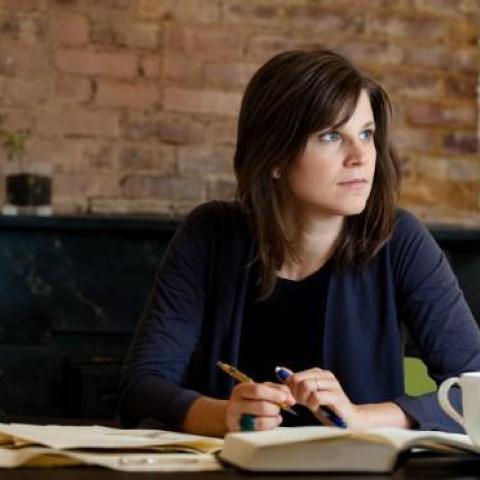

Suzanne Farrin is a composer whose works have been performed around the world. Anthony Tommasini of the New York Times called her first opera, dolce la morte, a work of “shattering honesty.” Her debut recording, Corpo di Terra, was described in Timeout Chicago, “like field recordings from inside the cerebral cortex.” Recent commissions include works for Talea Ensemble, The Library of Congress, Sō Percussion, JACK Quartet, and The International Contemporary Ensemble. She was a 2018 Rome Prize Winner and a 2020 Guggenheim Fellow in Composition.
In addition to composing, Suzanne is a performer of the ondes Martenot, an early electronic instrument created by the engineer Maurice Martenot in the 1920s as a response to the simultaneous destruction and technological advances of WWI. Her life as an interpreter on the instrument has taken her to venues such as the Abrons Arts Center in NYC, Centro de Artes in Buenos Aires, as well as film and television. She has performed in film scores such as Chicuarotes (Gael Garcia Bernal, director), Sade Ma’bar/Blockage (Mohsen Gharaie, director), and USERS (Natalia Almada, director), which was featured at the 2021 Sundance Film Festival. She appears as herself in an episode of the Amazon series Mozart in the Jungle (Roman Coppola, director).
Suzanne is the Frayda B. Lindemann Chair of Music at Hunter College and The C.U.N.Y. Graduate Center, where she teaches composition. She has been the lead mentor composer for Evolution: Quartet at the Banff Centre since 2021. She holds a doctorate in from Yale University. Her next opera, Macabéa, will be premiered at the Theatro São Pedro in São Paolo, Brazil in 2025 and is supported by the Siemens Foundation and the Consolate General of Brazil in New York.
Faculty Composer
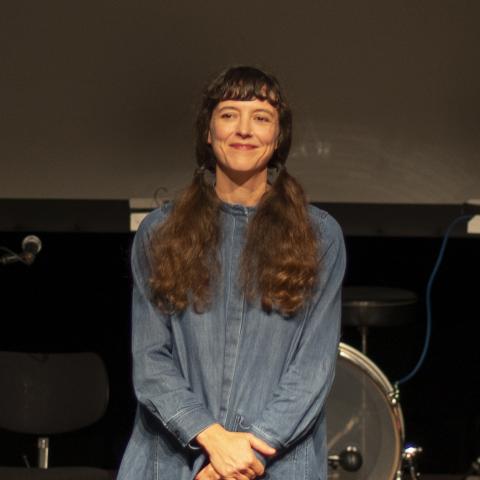

Natacha Diels
Natacha Diels’ work combines ritual, improvisation, traditional instrumental practice, and cynical play to create worlds of curiosity and unease. Recent work includes the completion of a series of fairytales/nightmares for performers, and the construction of a Portal with her performance duo On Structure.
Natacha founded the experimental music collective Ensemble Pamplemousse in 2003, and continues to be its director and flautist. In 2009, she co-founded the performance duo On Structure with Jessie Marino. Pamplemousse specializes in unique aspects of composition and new music, from complex virtuosic instrumental performance to experimental theatre to electronic and robotic performance. Inexorably uncompromising, the group has developed its name by presenting exquisitely challenging music at both internationally recognized festivals such as Borealis Festival (Norway) and Transparent Sound Festival (Budapest), and lesser-known gems such as Louisville’s Experimental Music Festival (Kentucky). On Structure is a sound-centric highly choreographed paradoxically improvisatory collaboration project, performing whenever travel paths collide. In 2016, On Structure was featured at SPOR Festival (Denmark) and Omaha Under the Radar (Nebraska).
With a focus on choreographed movement, traditional instrumental technique, and a wide array of Do It Yourself electronics, Natacha’s compositions have been described as “a fairy tale for a fractured world” (Music We Care About) and “fantastic playful modern chamber music full of magic and wit” (Vital Weekly). As composer, she has been featured at international festivals such as Darmstadt International Summer Institute (Allemagne), SPOR Festival (Denmark), Borealis Festival (Norway), Mostly Mozart at Lincoln Center (New York City), Maerz Musik (Denmark), Sweet Thunder (San Francisco), and MATA Festival (New York City), among others. She has written works for Ensemble Pamplemousse, TAK Ensemble, JACK quartet, Ensemble Adapter, ICE, Talea Ensemble, Dal Niente Ensemble, Anne LaBerge, and Diamanda Dramm; and soloists Maria Stankova, Ross Karre, and Heather Roche. Her music been performed by ensembles worldwide such as Mocrep, Plus/Minus, the San Francisco Contemporary Music Players, the New York New Music Ensemble, and Sonar Quartet.
As flautist, Natacha's performance has been likened to “an insane, barking bird who can’t find his way out of his own birdcage” (The Sound Projector).
Natacha has taught courses in electronic and computer music at Columbia University and Parson’s School of Design; and has conducted numerous workshops or lectures in composition and computer music at schools such as the School at the Art Institute of Chicago, Columbia College, Wesleyan University, and University of Southern California. A devoted teacher of all ages, Natacha has also designed and taught workshops to children at the Montessori School of Raleigh, the Upper Catskill Community Center for the Arts, and a summer music camp in Léogane, Haiti. She holds degrees in flute performance and integrated digital media from NYU, in music composition from Columbia University, and currently teaches composition and computer music at the University of California, San Diego.
Faculty Composer
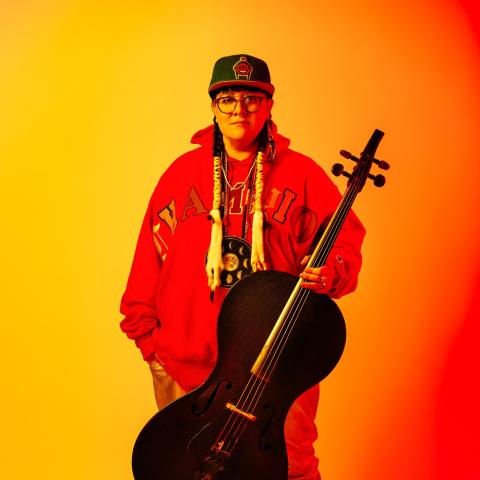

Juno nominated Cris Derksen is an internationally respected Indigenous Cellist and Composer. In a world where almost everything — people, music, cultures — gets labelled and slotted into simple categories, Cris Derksen represents a challenge. Originally from Northern Alberta she comes from a line of chiefs from North Tallcree Reserve on her father’s side and a line of strong Mennonite homesteaders on her mother’s. Derksen braids the traditional and contemporary, weaving her classical background and her Indigenous ancestry together with new school electronics to create genre-defying music. As a performer Derksen performs nationally and internationally as a soloist and in collaboration with some of Canada’s finest, including Tanya Tagaq, Buffy Sainte Marie, Naomi Klein, and Leanne Simpson, to name a few. Recent concert destinations include Hong Kong, Australia, Mongolia, Sweden, and a whole lot of Canada: the place Derksen refers to as home.
2021 commissions include pieces for the Calgary Philharmonic Orchestra, Ottawa's Chamberfest, the City of Toronto, Edmonton New Music, the Edmonton Symphony with support from the National Arts Centre, Vancouver's Blueridge Chamber Festival, Vancouver Transform Cabaret, and a 4-part docuseries for the Knowledge Network.
Faculty Cellist
Phone (Main Switchboard)
403.762.6100
Address
107 Tunnel Mountain Drive
PO Box 1020
Banff, Alberta
Canada
T1L 1H5
Follow Us
We recognize, with deep respect and gratitude, our home on the side of Sacred Buffalo Guardian Mountain. In the spirit of respect and truth, we honour and acknowledge the Banff area, known as “Minihrpa” (translated in Stoney Nakoda as “the waterfalls”) and the Treaty 7 territory and oral practices of the Îyârhe Nakoda (Stoney Nakoda) – comprised of the Bearspaw, Chiniki, and Goodstoney Nations – as well as the Tsuut’ina First Nation and the Blackfoot Confederacy comprised of the Siksika, Piikani, and Kainai. We acknowledge that this territory is home to the Shuswap Nations, Ktunaxa Nations, and Metis Nation of Alberta, Rockyview District 4. We acknowledge all Nations who live, work, and play here, help us steward this land, and honour and celebrate this place.
